By Alexandra Madhavan

Best of 2016
My husband is from South India and I am Canadian. We are the living, walking, breathing epitome of cultural differences – he is Hindu, I am Catholic; he is a strict vegetarian, I am not; he comes from a huge traditional Iyengar family, I come from a very small Canadian family. We met and fell in love 10 years ago in college, and it still stands that he’s the best thing that ever happened to me. I fell in love with him because he was perfect for me – and he just happened to be from a completely different culture than my own.
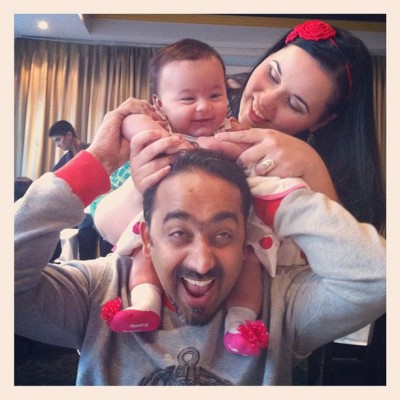
Sure, we have had our challenges. There were difficulties being accepted by his family, we still have frequent misunderstandings, we get stared at a lot in public, and we feel a bit isolated in our journey as an intercultural couple because our mix is such a rarity. But our journey getting to know each other’s cultures has been beautiful, mind-blowing and so interesting.
A lot of times people only discuss the struggles of being in an intercultural relationship, but I have found that the benefits far out-weigh the bad.
For example:
1. You have the option of settling in two countries.
Being able to choose between TWO countries to settle in is a chance that the average person doesn’t have. Being married to an Indian, I can work/live/study in India at any time I like, which opens up so many possibilities for me.
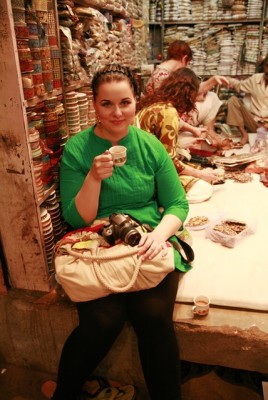
Once you get the visa and immigration issues figured out, it’s pretty cool to have the option of having a second homeland. It’s comforting to know that if things aren’t working out for us in Canada, that we can always have a new beginning in India. Plus, intercultural couples who live in a third country have THREE countries to choose from! Now isn’t that grand?
2. Life is a big non-stop party!
There’s nothing I love more than an excuse to celebrate life and have a gathering with family and friends. Being in an intercultural relationship, you have double the holidays. From Christmas to Pongal, Easter to Tamil New Year’s, Dussehra to Diwali, and Halloween…it’s basically party central – all year round! I love learning about my husband’s festivals and incorporating them into our life. We’re constantly planning and looking forward to the next cultural holiday.
3. FOOD
One thing’s for sure – you’ll never get bored with dinner. Having a spouse from a different culture has introduced me to a completely different cuisine – South Indian vegetarian food. Indian food is completely different when it is home cooked – it is amazing. I don’t feel bad about putting on weight because it has been so worth it eating these delicious meals that I would not otherwise have tasted. I have also enjoyed learning how to cook them and have made them for my friends and family – my husband’s Biriyani at Christmas is legendary.
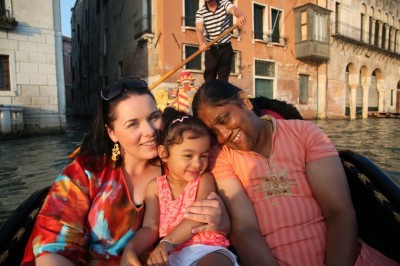
My friends and family have been blown away by how different (and more delicious) home-cooked Indian food tastes, as opposed to the Indian restaurant food they have been exposed to.
Learning a different cuisine has also inspired me to add more Indian spices to my Canadian recipes – thus making a unique fusion cuisine! I also love the South Indian style of eating food – with your hands, and on a banana leaf (eating dosa with a fork just doesn’t do it justice!).
4. You travel a lot.
Having a spouse from a different culture means that you’re constantly planning your next trip to visit their homeland and family elders. There is no direct flight to India, so as a result we usually end up stopping in a completely random place (Hong Kong, Dubai, London) in transit. Discovering these places has been a happy surprise, and when we’re planning our flights to India we are always on the lookout for a cool stopover trip (and it helps with jet-lag too!).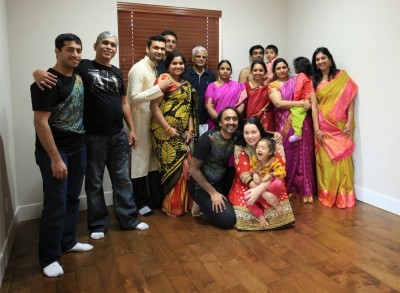
And even though we go to India to visit my husband’s family, we always plan to explore India together by visiting different places outside my husband’s region. Most of my friends consider me a walking Indian guidebook/flight guru! An added benefit of this is that your family and friends are also more interested to travel with you as you tell them about your explorations around the globe.
5. Mixed children look universal and can easily adapt to any culture.
My daughter is a total chameleon. With me, she looks white. With my husband, she looks Indian. When we were in Hawaii, people thought she was Polynesian. She also looks somewhat Latina. People have also mistaken her as being half-Chinese. Her features are universal. Whenever we travel, she fits in everywhere. She makes friends with everybody and she’s not scared of anything. This adaptability and flexibility to other cultures comes from our home environment and the way that we are raising her – with respect to both our diverse cultures, and an integration into many others. She is very much a global citizen.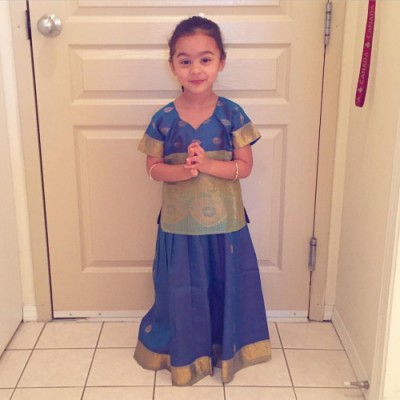
6. The chance to learn different language(s).
Most people would like to learn another language, but they have to sign up for a class and find a way to practice it. When you marry a spouse from a different culture, you automatically have a language teacher. Just from overhearing them converse with their family, you can pick up on many words and pronunciation.
My husband speaks 7 Indian languages and 3 dominantly in his home (Tamil, Telugu, Hindi). Learning a few more languages has been an unexpected surprise and it challenges my mind. Plus, you can practice it all the time! My husband has also started picking up a bit of French, since everything in Canada is written in French and English. An added benefit is that your kids will most likely be raised bilingual, or even trilingual.
7. Your mind is continually opened.
It has been amazing learning about my spouse’s culture, and I am still learning more every day. In a sense, I feel like my spouse’s culture has adopted me and accepted me, partly because of my interest and willingness to learn. When my husband explains his culture to me, I feel more connected to it as I am more intimately exposed to it. When you learn about a different culture in a positive way, you also stop thinking that your own culture is superior to others. It’s great to learn how different cultures do things and then apply it to your own life – anything from mealtimes to parenting. It adds diversity to your daily life.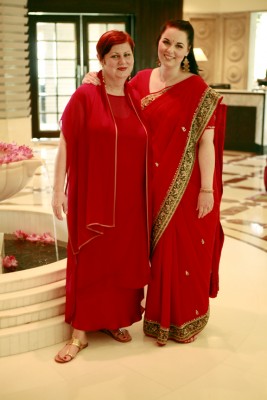
8. Your friends and family are introduced to diversity.
In an intercultural relationship, your mind is continually opened to different ways of life. One of the unforseen side effects of this is that it positively effects your friends, family, and community. We introduce our friends to our respective cultures by sharing our travel experiences, inviting them to festivals, and making them try new dishes. Another important thing is that we break a lot of stereotypes.
Many people in my husband’s family thought Western women couldn’t cook and have no family values, which has been completely squashed, thanks to me! Simultaneously, people in my family thought that Indians couldn’t speak English or are too traditional, which has also been completely squashed. By introducing our friends and family to other ways of life, they will subsequently learn from us and carry our stories with them to teach others. Intercultural relationships can and will change the world.
9. People praise us.
Fifty years ago, interracial marriages were outlawed in certain parts of the world. Many people still frown upon them because they simply don’t understand them. Interracial marriages are still very much a minority, but they are occurring more and more in our global world. We do get a lot of unkind stares and judgement from strangers, but we also get a lot of praise – more than the average same-culture couple. Sometimes people will smile at us, say that we look beautiful together, or marvel at our child.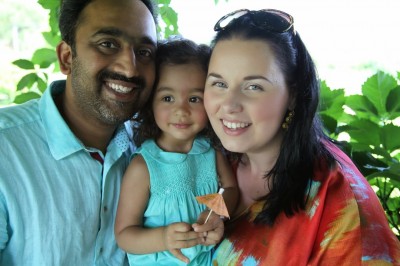
A lot of strangers feel pride towards us because we were able to look past our differences, love each other, and bravely build a life together. People admire us for this and they wish they could be like that too. Intercultural marriages are very much pioneers, and it’s nice to get some appreciation for that once in a while!
While being in an intercultural relationship is not easy, it’s the experience of a lifetime. I feel fortunate to be in an intercultural marriage and have the chance to live between two cultures and celebrate them both. It is an amazing opportunity filled with personal growth. Growing up, I never expected my life to look like this, but I wouldn’t change a thing!
Read more about Alexandra’s journey blogging an intercultural marriage here.
You can also visit her blog and follow her on twitter @madh_mama.
©masalamommas and masalamommas.com, 2016-2017. Unauthorized use and/or duplication of this material without express and written permission from this site’s author and/or owner is strictly prohibited. Links may be used, provided that full and clear credit is given to masalamommas.com and Masalamommas online magazine with appropriate and specific direction to the original content.


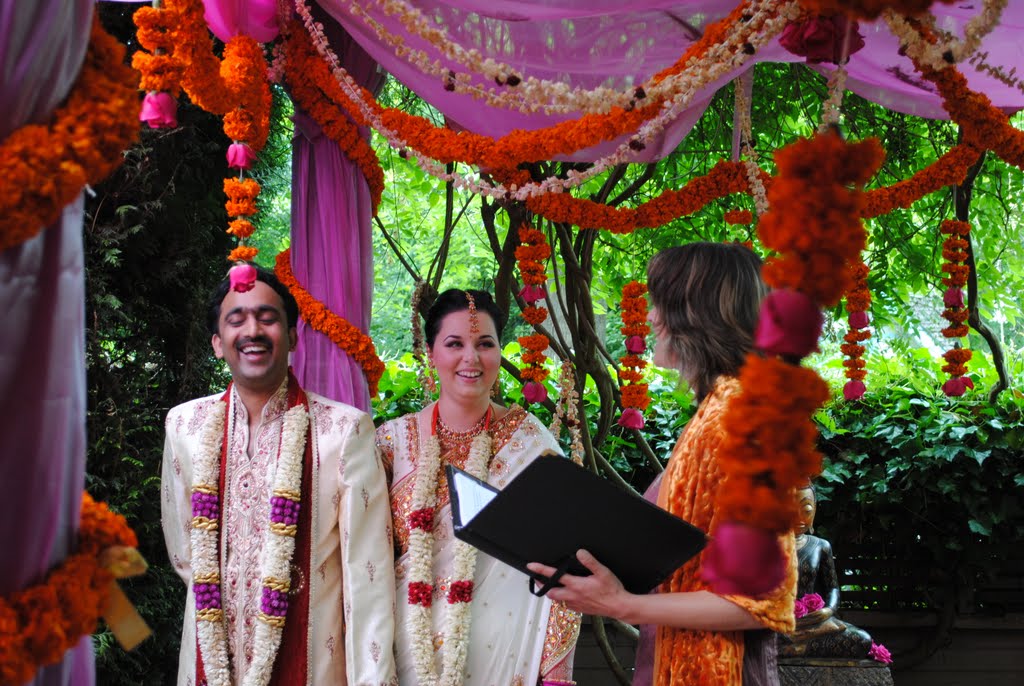
What a beautiful article! I’m also in an intercultural relationship (English-Indian Punjabi) and I also agree the benefits far outweigh the challenges. I especially like your philosophy that intercultural relationships can and will change the world! The biggest challenge we face in global society is smashing prejudice and inequality and love is the biggest weapon for peace.
I heard a beautiful story recently of an English girl and Syrian boy falling in love at the refugee camp she was volunteering at. True love is blind to conflict, culture, economic background, social status and distance. Often we only hear the negative stories so it is refreshing to hear such a lovely positive one!
What a lovely article. I’m sure it must have been a struggle to get adjusted your new dynamic but your beautiful perspective would have helped I’m sure.
Wow, I loved this article. Thank you so much for writing it. I learnt a lot. I am writing a paper on “The Effects of Cultural Differences in Intercultural Marriages” and your blog helped a lot.
I’m glad you were able to adjust to a new culture. Wishing you all the happiness in your marriage in the future!
I am a semi-Indian Pakistani Muslim and my father is skeptical of intercultural marriage, but my faith teaches that universal piety is more important than limited tradition. But still traditional cultures still find it difficult to embrace universal spirituality.